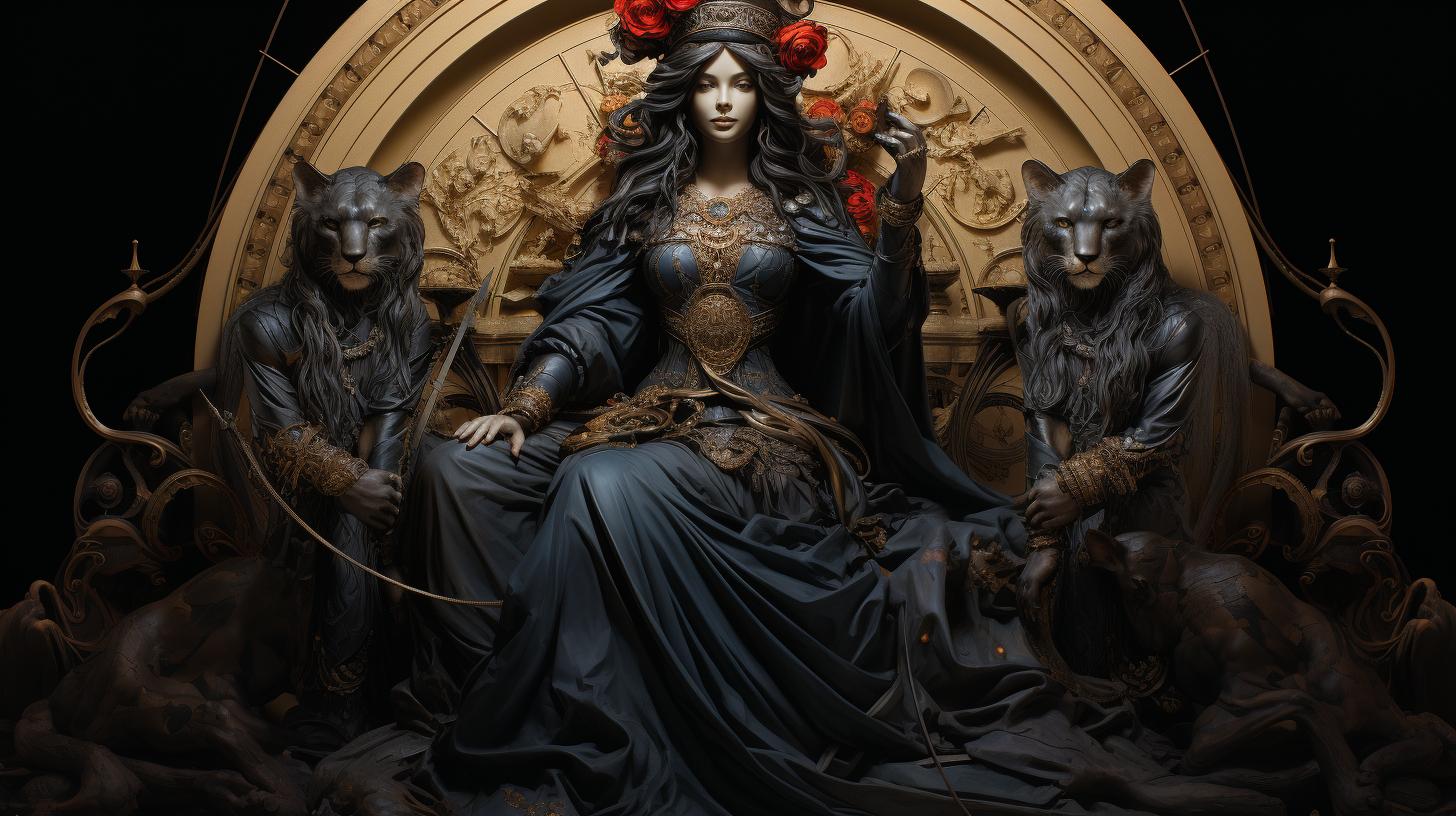Lucina Goddess: Unveiling the Mysteries of the Roman Light and Birth Deity

Lucina goddess is a prominent deity in Roman mythology, revered for her association with light and childbirth. Also known as the protector of pregnant women and newborns, Lucina’s worship was deeply ingrained in Roman culture.
This article explores Lucina’s origins, her connections to Juno and Diana, and her role in safeguarding women and children during childbirth . Additionally, it delves into Lucina’s counterparts in Greek and Egyptian mythology, her symbolism, and her relevance in contemporary culture.
Join us as we unravel the mysteries surrounding the esteemed Lucina goddess.
The Role of Lucina in Roman Mythology
Lucina is a revered figure in Roman mythology, with her significance rooted in the realms of light and birth. This section explores the origins of Lucina goddess, delving into the epithet of her divine persona and her association with the prominent goddesses Juno and Diana.
Origins of Lucina Goddess
The name Lucina derives from the Latin word ‘lux’, meaning light.
It is believed to be a reference to Venus as the morning star, representing the radiant illumination that accompanies new beginnings. Lucina’s prominence as a deity associated with childbirth suggests a close affinity to the birthing process and the emergence of life.
Lucina’s Epithet as the Goddess of Light and Birth
Lucina is hailed as the goddess of light and birth, embodying the illuminating and life-giving aspects of existence. Her very essence radiates maternal care, protection, and guidance for women during their pregnancy journey.
Lucina grants strength and safe passage to both mothers and their newborns as they navigate the transformative experience of childbirth.
Lucina’s Association with Juno and Diana
Lucina shares a profound connection with Juno, the queen of the gods, and Diana, the goddess of the moon and the hunt. In various representations, Lucina is depicted alongside these revered goddesses, as they collectively embody the aspects of protective maternity, the lunar cycles, and the cycles of life.
Lucina’s association with Juno and Diana showcases her integral role within the Roman pantheon and highlights her ability to guide and safeguard women through the intricate stages of childbirth.
Lucina and Childbirth in Roman Religion
Lucina, the Roman goddess associated with childbirth, held a significant role in Roman religious beliefs and practices. Revered as the protector of women and children, her cult and worship practices were deeply ingrained in the Roman society.
Lucina’s Cult and Worship Practices
The cult of Lucina involved specific rituals and ceremonies dedicated to her. In temples dedicated to the goddess, priestesses performed sacred rites and offered prayers to seek her blessings for safe deliveries and healthy newborns.
These religious practices often included the lighting of candles or lamps as symbols of illuminating the birthing process and invoking Lucina’s divine presence.
The Role of Lucina in Safeguarding Women and Children
Lucina was considered a guardian deity for expecting mothers and their children. Pregnant women would seek her protection and assistance during childbirth, offering prayers for a safe and successful delivery.
It was believed that Lucina would guide the women through the challenges of labor and ensure the well-being of both mother and child. She was seen as a comforting presence, providing strength and support during this time of vulnerability.
Festivals and Celebrations in Honor of Lucina
Various festivals and celebrations were held in honor of Lucina, highlighting her significant role in Roman culture. One such celebration was the Lucinaia festival, dedicated entirely to Lucina’s worship. During this event, women gathered to offer prayers and make offerings, expressing gratitude for her assistance in childbirth and protection of infants.
The festival also aimed to assist women who faced difficulties in conceiving, seeking Lucina’s favor for fertility blessings.
Another notable celebration was the Matronalia, held in March, which paid homage to women in general, including mothers and pregnant women. This festival provided an opportunity to offer thanks to Lucina for her guidance and blessings in childbirth.
It also served as a reminder of the crucial role women played in the Roman society, highlighting their strength and resilience.
- The Lucinaia festival was dedicated to honoring Lucina’s role in childbirth and protection.
- The Matronalia celebration paid homage to women, including mothers and pregnant women.
These festivals not only showcased the devotion towards Lucina but also reinforced the strong connection between the goddess, women, and the important stages of motherhood.
In conclusion, Lucina’s importance in Roman religion and society cannot be understated. Her cult and worship practices, along with festivals dedicated to her, emphasized her role as the guardian deity of childbirth and the protector of women and children.
Through these rituals and celebrations, the Romans expressed their gratitude and sought Lucina’s blessings for safe pregnancies, successful deliveries, and thriving infants.
Lucina Goddess in Greek and Egyptian Mythology
The exploration of Lucina goddess extends beyond Roman mythology and reveals fascinating connections to Greek and Egyptian lore. This section delves into her associations with the Greek goddess Eiléithyia and the Egyptian deity Nekhbet, shedding light on Lucina’s transcultural significance.
Connections between Lucina and Eiléithyia
Lucina’s connection to the Greek goddess Eiléithyia is deeply rooted in their shared domain of childbirth and labor. Eiléithyia, known as the protectress of childbirth, guided women through the pains and joys of bringing life into the world.
The parallels between Eiléithyia and Lucina highlight the universality of the maternal experience across cultures.
According to mythology, Lucina and Eiléithyia often collaborated during childbirth, offering their guidance and blessings to ensure safe deliveries.
This harmonious relationship signifies the intrinsic bond between these goddesses, each revered for their ability to navigate the delicate balance of life and death.
Lucina’s Relationship with Nekhbet
Delving into Egyptian mythology, one discovers a significant relationship between Lucina and the goddess Nekhbet. Nekhbet, often depicted as a vulture goddess, symbolizes protection, particularly associated with fertility, birth, and life.
Lucina’s connection with Nekhbet signifies the universal reverence for the divine aspects of women’s reproductive cycles throughout ancient cultures. Their intertwined stories highlight the spiritual significance attributed to the birthing process, symbolizing the eternal cycle of life and the role of divine intervention in ensuring the continuity of generations.
The bond between Lucina and Nekhbet underscores the shared human experience and the veneration of motherhood as a sacred source of life.
Symbolism and Iconography of Lucina Goddess
Symbolism and iconography play a significant role in depicting the essence and attributes of Lucina goddess. The visual representations of Lucina in art and sculpture provide insight into the beliefs and cultural significance surrounding her divine nature.
Depictions of Lucina in Art and Sculpture
Artistic renditions of Lucina often showcase her as a radiant figure embodying the symbolism of light and birth. In these depictions, she is portrayed with a sense of grace and maternal power, emphasizing her role as the patron deity of pregnancy and childbirth.
Sculptures and reliefs capture her trademark attributes, such as the crescent moon adorning her forehead, symbolizing her association with lunar cycles and fertility.
One of the notable masterpieces of Lucina goddess is the ancient bronze mask of Juno Lucina.
This intricately crafted mask showcases Lucina with her hair braided and a crescent moon prominently displayed on her forehead, further highlighting her connection to the lunar aspect of her domain.
Symbolic Representations Associated with Lucina
Lucina goddess is often depicted holding symbols that represent her significance in facilitating childbirth and ensuring the well-being of women and infants.
One common symbol is the flower, particularly the magical flower granted to Juno Lucina by Flora, which played a role in the conception of her son Mars. This flower represents fertility and the transformative power of nature in the process of creation.
Additionally, the flame is a symbol associated with Lucina, representing the transformative light that guides women through the journey of childbirth. It symbolizes the divine presence and protective energy that Lucina bestows upon expectant mothers and newborns alike.
In summary,
Symbolism and iconography surrounding Lucina goddess provide visual representations of her role and attributes. Through art and sculpture, we witness her radiance, maternal power, and association with the lunar cycles. Symbols such as the crescent moon, flowers, and flames further deepen our understanding of her role in facilitating childbirth and safeguarding the well-being of women and newborns.
Lucina Goddess in Modern Culture
Lucina goddess continues to exert her influence in various aspects of modern culture. Her association with women’s health and empowerment has made her a symbol of strength and resilience for many.
Lucina’s Influence on Women’s Health and Empowerment
Lucina goddess is celebrated for her role in safeguarding women during childbirth, making her an emblem of women’s health and well-being. Her representation as a protector has inspired movements towards improving maternal healthcare and promoting access to comprehensive reproductive services.
As society evolves, Lucina’s name often emerges in discussions surrounding maternal care policies, advocating for better resources, and empowering women to take charge of their reproductive rights. Her timeless presence in modern culture serves as a reminder of the importance of supporting women throughout their journey to motherhood.
The Impact on Maternal Mental Health
Lucina’s influence extends beyond physical health and encompasses mental well-being. Recognizing that women’s emotional states directly affect their childbirth experiences, initiatives have arisen to address postpartum depression and provide mental health support to new mothers.
Lucina’s presence symbolizes the holistic care necessary for women’s empowerment, emphasizing the need for comprehensive mental health programs.
Advocacy for Women’s Rights
Lucina goddess’s association with women’s health has also led to her representation in movements advocating for gender equality and women’s rights. Her story highlights the historical struggles women faced during childbirth and serves as a symbol of resilience in the face of adversity.
Through awareness campaigns and activism, the importance of equitable access to healthcare, education, and employment opportunities for women is highlighted, drawing inspiration from Lucina’s spirit of protection and empowerment.
Lucina’s Relevance in Contemporary Feminist Movements
Lucina goddess’s symbolism has found resonance in contemporary feminist movements.
Her representation of female strength, fertility, and protection fuels discussions surrounding female empowerment and the dismantling of gender-based biases and inequalities.
Redefining Motherhood
Feminist movements have worked to redefine traditional notions of motherhood, focusing on inclusivity and embracing various forms of mothering. Lucina’s symbolism as a guardian of both biological and non-biological children contributes to the broader conversation around diverse family structures and challenges societal norms.
Embracing Female Spirituality
Lucina’s mythology intertwines with ancient goddesses from different cultures, bridging cultural gaps and celebrating the shared experiences of women. Contemporary feminist movements often incorporate elements of female spirituality, drawing inspiration from Lucina and her divine counterparts to reclaim and celebrate feminine power.
Considered a timeless deity, Lucina goddess continues to inspire and influence modern culture, leaving an indelible mark on women’s health, empowerment, and the ongoing pursuit of gender equality.
Exploring Lucina Goddess: Debunking Myths and Misconceptions
Common Misinterpretations of Lucina’s Role
Lucina, the Roman goddess of light and birth, has often been misunderstood and misinterpreted throughout history.
It is crucial to debunk these misconceptions to gain a clearer understanding of her true significance in Roman mythology and culture.
Limited Role as a Childbirth Deity
One common misconception is that Lucina’s influence was solely restricted to childbirth. While she was indeed revered as the protector of pregnant women, her domain extended beyond childbirth. Lucina symbolized the transformative power of light and was associated with the cycle of life and rebirth.
Exclusively Linked to Juno and Diana
Another misconception is that Lucina’s presence was overshadowed by her association with Juno and Diana, the other prominent Roman goddesses. While Lucina was indeed connected to these goddesses, she possessed her own distinct identity and was celebrated in her own right.
Ignored in Contemporary Feminist Discourse
Some may assume that Lucina has been disregarded in modern feminist movements. However, Lucina’s role as a protector of women and her association with fertility and empowerment make her relevant and deserving of recognition in discussions on women’s rights and feminist discourse.
Clarifying Lucina’s Position in Roman Religion
To gain a more accurate understanding of Lucina’s position in Roman religion, it is important to shed light on her significance and clarify her role in the pantheon of gods and goddesses.
An Honored Goddess in Roman Religion
Lucina was a revered and respected deity in ancient Rome, with her own dedicated cult and worship practices. Women sought her aid and protection during pregnancy and childbirth, and her influence was widely acknowledged and celebrated.
Harmonious Relationship with Other Deities
Contrary to the belief that Lucina was overshadowed by other goddesses, she maintained harmonious relationships with deities like Juno and Diana. They complemented each other’s roles and jointly contributed to the spiritual and societal well-being of the Roman people.
Continuity of Lucina’s Worship
Lucina’s worship continued beyond ancient Rome, with her influence reaching Greek and Egyptian mythology. Her connections with Eiléithyia, the Greek goddess of childbirth, and Nekhbet, the Egyptian goddess associated with protection, further highlight her significance and enduring impact.
In conclusion, debunking the myths and misconceptions surrounding Lucina goddess is crucial to gaining a deeper understanding of her true role in Roman mythology and religion. By recognizing her multi-faceted nature and clarifying her position among other deities, we can appreciate Lucina’s enduring relevance and influence, both in ancient times and in contemporary discussions on women’s rights and empowerment.
.




















